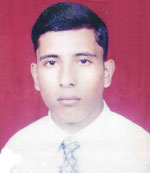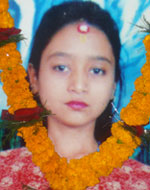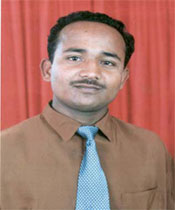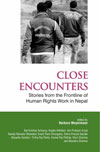Related Links
Case Updates
Krishna Adhikari
 On 6 June 2004, Krishna Prasad Adhikari, a resident of Fujel village of Gorkha District, was murdered in Chitwan District by Maoist cadres. Krishna Prasad was visiting his grandparents after having taken the SLC examinations, and he was abducted from Bakullahar Chowk by men who came on a motorcycle ...
On 6 June 2004, Krishna Prasad Adhikari, a resident of Fujel village of Gorkha District, was murdered in Chitwan District by Maoist cadres. Krishna Prasad was visiting his grandparents after having taken the SLC examinations, and he was abducted from Bakullahar Chowk by men who came on a motorcycle ... Maina Sunuwar
 Around 6 am on February 17, 2004, a group of RNA soldiers arrested Ms
Maina Sunuwar, a 15-year-old schoolgirl of Kharelthok VDC-6, Kavre
district. She disappeared since her arrest. Her family members, with
support from villagers and school where Maina was a student, visited
detention centers ...
Around 6 am on February 17, 2004, a group of RNA soldiers arrested Ms
Maina Sunuwar, a 15-year-old schoolgirl of Kharelthok VDC-6, Kavre
district. She disappeared since her arrest. Her family members, with
support from villagers and school where Maina was a student, visited
detention centers ... Sanjeev Kumar Karna
 Sanjeev Kumar Karna was one among the 11 persons arrested on October 8, 2003. On that fateful day, they had gone to attend a picnic program organized by the students at a place called Kariyachauri VDC-4, and from picnic, they went to Kataiya Chowri Area of Dhanusha district where they ate some food ...
Sanjeev Kumar Karna was one among the 11 persons arrested on October 8, 2003. On that fateful day, they had gone to attend a picnic program organized by the students at a place called Kariyachauri VDC-4, and from picnic, they went to Kataiya Chowri Area of Dhanusha district where they ate some food ... Arjun Bahadur Lama
Arjun Bahadur Lama, 48 years in age, permanent resident of Chhatrebas
VDC -5, Dapcha in Kavre district was abducted by a group of Maoist
cadres, three in number, on 29 April 2005 (2062.1.16 BS) from the
premises of Sri Krishna Secondary School at Chhatrebas VDC-1 of the
district.
» more
Hari Prasad Bolakhe
Hari Prasad Bolakhe, 35 (while missing) a permanent resident of Phulbari VDC-8, Kavre district, a pastor by profession, had been missing since the arrest December 27, 2003, was reportedly killed by security persons. A team of National Human Rights Commission discovered a human skeleton in a jungle ...
» more
Sarala Sapkota
Around 11 p.m. on July 15, 2004, a group of 12 armed soldiers arrested
Sarala Sapkota at her grandfather’s house. The family, who witnessed the
arrest, stated that soldiers gave Sarala no reason for her arrest.
After her arrest, Sarala’s family went to Baireni barracks and the DPO ...
» more
Birendra Shah
On the evening of 5 October 2007, Mr. Birendra Shah, 34, resident of Inruwasira VDC-8, Bara district, a local journalist of Bara district and correspondent of Nepal FM, Avenues Television and Dristi weekly, was abducted by Maoists from Pipara Bazaar in Kalaiya, the district headquarters of Bara ...
» more
Bishwanath Parajuli, Tom Nath Poudel and Dhan Bahadur Tamang
Three persons namely Bishwonath Parajuli (also called Nagendra
Parajuli), Tom Nath Poudel and Dhan Bahadur Tamang of Hasandaha VDC,
Morang were shot dead by the security personnel on 28 September 2004.
According to the eyewitnesses, other victims and the villagers, about 16
people were arrested ...
» more
Chot Nath Ghimire and Shekhar Nath Ghimire
Chot Nath Ghimire, a 58-year-old farmer, resident of Ishaneshor VDC-4,
Ratamate Majhpokhari of Lamjung district was allegedly arrested by the
Joint Security Forces of Joint Security Camp stationed at Bhorlatar VDC,
Lamjung district on February 2, 2002 (2058.10.20). The security camp
called Mr. ...
» more
Bhauna Tharu
Bhauna Tharu (Bhauna Chaudhary in the citizenship card), 21 years old
male (at the time of the incident; Date of Birthe: 8 September 1978),
son of Purna Bahadur Chaudhary, permanent resident of Sujanpur village,
Neulapur VDC-4, Bardiya district, and an employee of Rastriya Gobar Gas,
Gulariya, ...
» more
Review of the UPR recommendations-2 Extrajudicial killings
They made comprehensive recommendations to the government of Nepal to strengthen its approach to human rights. The outcome report of the UPR will be adopted at the 17th session of the Human Rights Council on 7 June. Prior to that event, Advocacy Forum and the Asian Human Rights Commission offer their comments on some of the central issues raised during the UPR and call for the prompt and thorough implementation of the recommendations accepted and a serious reconsideration of the recommendations rejected or simply noted as a basis for a comprehensive, credible and effective approach to human rights in Nepal.
Advocacy Forum and the Asian Human Rights Commission wish to express their concern toward the rejection of recommendations of the Universal Periodic Review urging the government to take necessary and immediate action to put an end to the impunity surrounding allegations of extrajudicial killings in the Terai. Although the issue was raised as a subject of concern by a number of peer countries taking part in the review, the government of Nepal refused to acknowledge the seriousness of the issue, suggesting that it is unlikely to take appropriate action. At the eve of the adoption of the final report of the UPR on Nepal, we urge the government to review those crucial recommendations and commit to implement them in good faith, in a transparent and verifiable manner.
Although human rights bodies have acknowledged that the occurrence of extrajudicial killings has undoubtedly reduced since the end of the conflict, the persistence of such allegations in the Terai and the absence of credible investigations surrounding them remain an issue of serious concern. In 2009 alone, 12 possible incidents of extrajudicial killings by Nepalese security forces were documented by Advocacy Forum, claiming the lives of 15 people and injuring 8. Advocacy Forum's report "Torture and Extrajudicial executions amid widespread violence in the Terai" analyses that "Each of these killings is presented by the security forces as killings during "encounters" between the police and the alleged members of these groups. However in none of the incidents is there any indication that members of the Nepal Police or Armed Police Forces were killed or injured. Instead, in several cases, witnesses have confirmed how they saw the victims initially being taken into custody and later saw them being deliberately killed or that they heard shots soon after they saw the police take away the arrested persons with their hands tied." In some of the cases documented, witnesses have also confirmed seeing the police shooting at an unarmed victim, and later disposing weapons around the victim's body to make the death appear like the outcome of an encounter. Similarly, the Office of the High Commission for Human Rights in Nepal indicated that between January 2008 and June 2010, it had "received reports of thirty-nine incidents, resulting in fifty-seven deaths, which involved credible allegations of the unlawful use of lethal force."
The case of Sahid Ullah Dewan, alias Adbul, shot in broad daylight by three policemen from Police Post, Bethary, Rupandehi District on 26 October 2009 illustrates at length the seriousness of the issue and the lack of government action to bring it to an end. The police claim that the victim was killed in an encounter and that they shot him in self-defence. However, several eye-witnesses assert that the victim was unarmed and shot in cold blood in a staged manner. Witnesses further asserted that they saw police officers placing pistols around the dead body. The District Police Office, Butwal, refused to register an FIR in that case. Despite of an order from the Appellate Court, Butwal, Rupandehi to promptly register the FIR and initiate an effective investigation, no investigation has been conducted so far. It has surfaced that the Public Prosecutor Office, Rupandehi is trying to withdraw the case, putting an end to investigation and preventing prosecutions and has sought approval from the Attorney General's office in that regard. This is in disregard of an order from the Appellate Public Prosecutor Office to investigate that case.
As part to the International Covenant on Civil and Political Rights, Nepal has an obligation to protect the right to life of all, to ensure that no one shall be arbitrarily deprived of his life and to ensure that those who had such rights violated have access to an effective legal remedy. Nepal has therefore a subsequent obligation to ensure that all case of use of lethal force by security forces are investigated by an independent and impartial body to determine the circumstances of the killings and undertake prosecutions against the state agents found to have illegally used lethal force against individuals which did not pose serious threats to their life.
Nevertheless, during the UPR process, the government has appeared unwilling to take concrete commitments to effectively address extrajudicial killings, in spite of its repeated lip-service to end impunity. Of particular concern is the government's rejection of a Czech Republic recommendation to implement the recommendations included in the OHCHR's investigative report and its indication that it objected to the findings of the report in its totality. AF and the AHRC take exception of that turn down as it denotes the government refusal to acknowledge the seriousness of the issue and to commit to concrete, specific and accountable measures to bring it to an end.
In response to recommendations respectively made by Japan and Hungary, the government indicated that it was already taking "necessary measures for the prevention" of extrajudicial killings, "ensuring swift and fair investigations on alleged misconduct by law enforcement authorities" and "ensuring the delivery of justice regarding these serious human rights violations". On the contrary, the cases documented indicate that the police almost always refuse to file First Information Reports at the demand of the family and to launch investigations into the circumstances of the killings. Court orders and National Human Rights Commission recommendations to investigate the circumstances of the killings are disregarded. When investigations are launched, they fall far from being independent, as they also involve police officers, sometimes from the same police station as those under investigation, thereby creating a direct conflict of interest. As shown in Dewan's case, witnesses and victims' families regularly fall prey to intimidations, threats and pressures from the alleged perpetrators. AF and ALRC are of the opinion that the current state of lack of investigation into allegations of extrajudicial killings accounts for a deep-entrenched climate of impunity which encourages further abuses and contribute to the degrading security climate of the Terai. We therefore urge the government of Nepal not to settle for the current state of investigation of allegations of extrajudicial executions in the Terai in Nepal, but instead to commit to develop mechanisms to guarantee thorough and independent investigations.
In light of the above, AF and the ALRC call upon the government of Nepal to accept the recommendations formulated by Denmark to "Investigate credible allegations of extra-judicial killings and introduce an independent complaint mechanism on the conduct of the security forces", which is currently being examined. In a context of regular police refusal to file FIRs, collusion of interests in investigations, allegations of police cover-up of the incident, we are of the opinion that it is only with such an independent oversight body that investigations can be considered credible and effectively guarantee the right to redress of the victims' families.
The government should also take concrete and specific commitments to ensure that the outcomes of such investigations should lead to legal prosecutions against the perpetrators and accept an Italian recommendation in that sense. Similarly, the government of Nepal is urged to accept the Italian recommendation to accept the request for a visit by the Special Rapporteur on extrajudicial, summary or arbitrary execution, which would contribute to lift the veil upon the current extent of extrajudicial killings in the Terai.
The recommendations related to concerns of extrajudicial killings formulated during the UPR process if accepted and seriously implemented by Nepal would form a framework to develop accountability for all the allegations of excessive and unlawful use of force by security forces in the country and would undoubtedly play an important part in the stabilisation and security of the Terai region, as well as develop trust between the state and the people. We therefore urge the government of Nepal to accept those recommendations and to commit to implement them promptly, transparently and in good faith.
Advocacy Forum and the Asian Human Rights Commission will continue to closely monitor the state of implementation of the UPR recommendations in Nepal.
« Back to overview
Advocacy Forum and the Asian Human Rights Commission wish to express their concern toward the rejection of recommendations of the Universal Periodic Review urging the government to take necessary and immediate action to put an end to the impunity surrounding allegations of extrajudicial killings in the Terai. Although the issue was raised as a subject of concern by a number of peer countries taking part in the review, the government of Nepal refused to acknowledge the seriousness of the issue, suggesting that it is unlikely to take appropriate action. At the eve of the adoption of the final report of the UPR on Nepal, we urge the government to review those crucial recommendations and commit to implement them in good faith, in a transparent and verifiable manner.
Although human rights bodies have acknowledged that the occurrence of extrajudicial killings has undoubtedly reduced since the end of the conflict, the persistence of such allegations in the Terai and the absence of credible investigations surrounding them remain an issue of serious concern. In 2009 alone, 12 possible incidents of extrajudicial killings by Nepalese security forces were documented by Advocacy Forum, claiming the lives of 15 people and injuring 8. Advocacy Forum's report "Torture and Extrajudicial executions amid widespread violence in the Terai" analyses that "Each of these killings is presented by the security forces as killings during "encounters" between the police and the alleged members of these groups. However in none of the incidents is there any indication that members of the Nepal Police or Armed Police Forces were killed or injured. Instead, in several cases, witnesses have confirmed how they saw the victims initially being taken into custody and later saw them being deliberately killed or that they heard shots soon after they saw the police take away the arrested persons with their hands tied." In some of the cases documented, witnesses have also confirmed seeing the police shooting at an unarmed victim, and later disposing weapons around the victim's body to make the death appear like the outcome of an encounter. Similarly, the Office of the High Commission for Human Rights in Nepal indicated that between January 2008 and June 2010, it had "received reports of thirty-nine incidents, resulting in fifty-seven deaths, which involved credible allegations of the unlawful use of lethal force."
The case of Sahid Ullah Dewan, alias Adbul, shot in broad daylight by three policemen from Police Post, Bethary, Rupandehi District on 26 October 2009 illustrates at length the seriousness of the issue and the lack of government action to bring it to an end. The police claim that the victim was killed in an encounter and that they shot him in self-defence. However, several eye-witnesses assert that the victim was unarmed and shot in cold blood in a staged manner. Witnesses further asserted that they saw police officers placing pistols around the dead body. The District Police Office, Butwal, refused to register an FIR in that case. Despite of an order from the Appellate Court, Butwal, Rupandehi to promptly register the FIR and initiate an effective investigation, no investigation has been conducted so far. It has surfaced that the Public Prosecutor Office, Rupandehi is trying to withdraw the case, putting an end to investigation and preventing prosecutions and has sought approval from the Attorney General's office in that regard. This is in disregard of an order from the Appellate Public Prosecutor Office to investigate that case.
As part to the International Covenant on Civil and Political Rights, Nepal has an obligation to protect the right to life of all, to ensure that no one shall be arbitrarily deprived of his life and to ensure that those who had such rights violated have access to an effective legal remedy. Nepal has therefore a subsequent obligation to ensure that all case of use of lethal force by security forces are investigated by an independent and impartial body to determine the circumstances of the killings and undertake prosecutions against the state agents found to have illegally used lethal force against individuals which did not pose serious threats to their life.
Nevertheless, during the UPR process, the government has appeared unwilling to take concrete commitments to effectively address extrajudicial killings, in spite of its repeated lip-service to end impunity. Of particular concern is the government's rejection of a Czech Republic recommendation to implement the recommendations included in the OHCHR's investigative report and its indication that it objected to the findings of the report in its totality. AF and the AHRC take exception of that turn down as it denotes the government refusal to acknowledge the seriousness of the issue and to commit to concrete, specific and accountable measures to bring it to an end.
In response to recommendations respectively made by Japan and Hungary, the government indicated that it was already taking "necessary measures for the prevention" of extrajudicial killings, "ensuring swift and fair investigations on alleged misconduct by law enforcement authorities" and "ensuring the delivery of justice regarding these serious human rights violations". On the contrary, the cases documented indicate that the police almost always refuse to file First Information Reports at the demand of the family and to launch investigations into the circumstances of the killings. Court orders and National Human Rights Commission recommendations to investigate the circumstances of the killings are disregarded. When investigations are launched, they fall far from being independent, as they also involve police officers, sometimes from the same police station as those under investigation, thereby creating a direct conflict of interest. As shown in Dewan's case, witnesses and victims' families regularly fall prey to intimidations, threats and pressures from the alleged perpetrators. AF and ALRC are of the opinion that the current state of lack of investigation into allegations of extrajudicial killings accounts for a deep-entrenched climate of impunity which encourages further abuses and contribute to the degrading security climate of the Terai. We therefore urge the government of Nepal not to settle for the current state of investigation of allegations of extrajudicial executions in the Terai in Nepal, but instead to commit to develop mechanisms to guarantee thorough and independent investigations.
In light of the above, AF and the ALRC call upon the government of Nepal to accept the recommendations formulated by Denmark to "Investigate credible allegations of extra-judicial killings and introduce an independent complaint mechanism on the conduct of the security forces", which is currently being examined. In a context of regular police refusal to file FIRs, collusion of interests in investigations, allegations of police cover-up of the incident, we are of the opinion that it is only with such an independent oversight body that investigations can be considered credible and effectively guarantee the right to redress of the victims' families.
The government should also take concrete and specific commitments to ensure that the outcomes of such investigations should lead to legal prosecutions against the perpetrators and accept an Italian recommendation in that sense. Similarly, the government of Nepal is urged to accept the Italian recommendation to accept the request for a visit by the Special Rapporteur on extrajudicial, summary or arbitrary execution, which would contribute to lift the veil upon the current extent of extrajudicial killings in the Terai.
The recommendations related to concerns of extrajudicial killings formulated during the UPR process if accepted and seriously implemented by Nepal would form a framework to develop accountability for all the allegations of excessive and unlawful use of force by security forces in the country and would undoubtedly play an important part in the stabilisation and security of the Terai region, as well as develop trust between the state and the people. We therefore urge the government of Nepal to accept those recommendations and to commit to implement them promptly, transparently and in good faith.
Advocacy Forum and the Asian Human Rights Commission will continue to closely monitor the state of implementation of the UPR recommendations in Nepal.
























Join Us